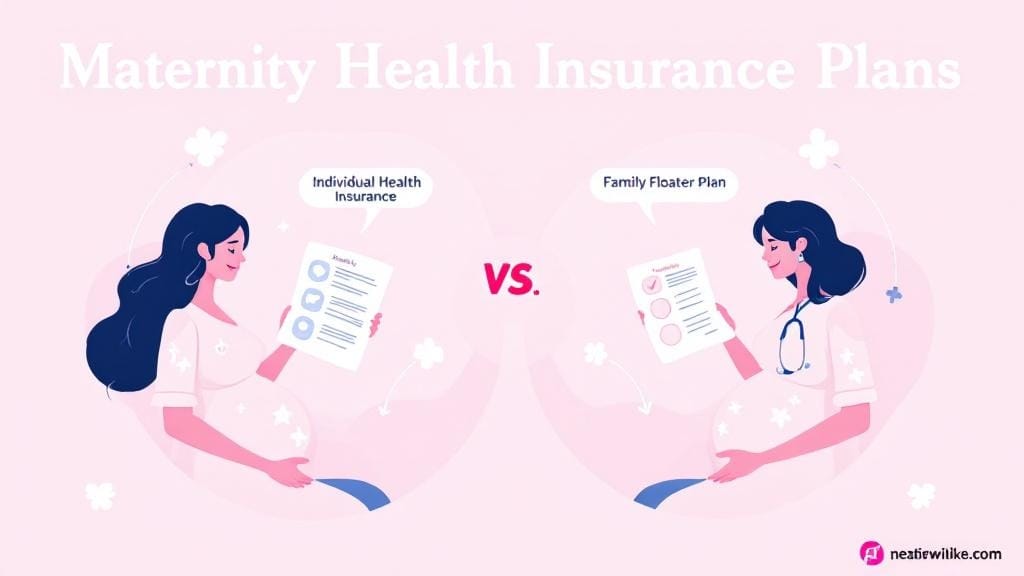When you’re planning to expand your family, one of the first things to consider is securing maternity health insurance. Whether you’re looking for maternity coverage for yourself or for your growing family, the decision often boils down to two main options: individual health insurance plans and family floater health insurance plans. Each has its advantages and potential drawbacks, and understanding how they apply to maternity insurance can help you choose the best option for your needs.
In this article, we’ll compare individual health insurance vs family floater plans specifically for maternity health insurance, helping you make an informed decision about your coverage.
What Is Maternity Health Insurance?
Maternity health insurance is a specialized policy designed to cover expenses related to pregnancy, childbirth, and post-delivery care. These expenses can quickly add up, including:
Hospital delivery costs
Pre-natal and post-natal care
Maternity-specific complications
Newborn baby care
If you are planning a pregnancy or already pregnant, maternity insurance coverage can significantly ease the financial burden.
Individual Health Insurance Plans: Pros and Cons for Maternity Coverage
Individual health insurance policies are tailored specifically to one person. They offer more control over the terms, including maternity coverage.
Advantages of Individual Health Insurance for Maternity
Personalized Coverage: Since the policy is for an individual, it can be customized to suit your specific maternity needs, such as coverage for IVF treatment or pregnancy complications.
No Shared Benefits: You are not sharing benefits with anyone else, meaning that the entire sum insured is available exclusively for you. This can be important if you anticipate high medical expenses for your pregnancy.
Maternity Coverage: Individual maternity insurance plans typically come with waiting periods (often 2-4 years), but they might offer more extensive maternity insurance benefits, covering both delivery and post-delivery care.
More Control Over Pre-existing Conditions: If you have any pre-existing conditions, individual policies are often more lenient, especially when looking for maternity insurance for pre-existing conditions.
Faster Claims Processing: With individual coverage, you might experience faster claims processing since there’s no shared coverage or dependents involved.
Disadvantages of Individual Health Insurance for Maternity
Higher Premiums: Individual plans tend to have higher premiums compared to family floater plans, making them less cost-effective in the long run.
Limited Family Coverage: If you have a family, you’ll need separate policies for each member, which could lead to higher overall costs.
Family Floater Health Insurance Plans: Pros and Cons for Maternity Coverage
Family floater plans are designed to cover multiple family members under a single policy. Typically, the sum insured is shared across the entire family, including spouses, children, and sometimes dependent parents.
Advantages of Family Floater Plans for Maternity
Cost-Effective: One of the major advantages of a family floater plan is that it usually comes with lower premiums than individual policies, especially when covering multiple family members.
Comprehensive Coverage for the Whole Family: Family floater plans with maternity coverage are ideal if you have a growing family, as they include coverage for your spouse and children, not just you.
Maternity Coverage for New Mothers: Many top maternity insurance providers offer maternity coverage under family floater plans, which means both pre-natal and post-natal care may be included, along with hospital delivery insurance.
Cashless Facility: Most family floater plans offer cashless delivery insurance at network hospitals, making the process easier and more affordable when it comes time to deliver your baby.
Disadvantages of Family Floater Plans for Maternity
Shared Coverage: The sum insured is shared among all family members. If you have a larger family, the coverage might not be enough to cover high maternity expenses, especially if multiple claims are made at once.
Maternity Insurance Waiting Period: Like individual policies, family floater plans also have a maternity insurance waiting period (usually 2-4 years). However, the waiting period might be a bit restrictive if you’re planning on having children sooner.
Limited Maternity Insurance Coverage for Pre-existing Conditions: While some family floater plans cover pregnancy complications insurance, they may not cover maternity insurance for pre-existing conditions in the early stages of pregnancy.
Impact of Claims: If one family member makes a large claim (for example, for a surgery or a significant medical emergency), it could reduce the available coverage for maternity-related expenses.
Which Plan is Better for Maternity Health Insurance?
The choice between individual health insurance vs family floater for maternity health insurance plans largely depends on your personal and family situation.
Choose Individual Health Insurance If:
You want personalized coverage tailored specifically to your maternity needs.
You prefer higher maternity coverage limits and specialized care.
You have pre-existing conditions that you want covered with minimal restrictions.
You want the whole sum insured dedicated to your medical needs without sharing it with anyone else.
Choose Family Floater Health Insurance If:
You are looking for affordable maternity insurance and want to cover your family with a single policy.
You’re planning for multiple pregnancies and need to factor in long-term family health expenses.
You want the convenience of cashless delivery insurance and easy access to hospital networks.
You are okay with sharing the sum insured across multiple family members.
Key Considerations When Choosing Maternity Health Insurance
Here are some important points to consider when selecting the right maternity health insurance plan:
Maternity Expenses Covered: Ensure that maternity expenses covered include pre-natal care, delivery charges, and post-natal care, as well as any complications that may arise during pregnancy.
Waiting Period: Be aware of the maternity insurance waiting period for both individual and family floater policies. Typically, policies will not cover maternity expenses for the first 2-4 years.
Coverage for Newborn Baby: Some plans also cover expenses for the newborn, which can be crucial. Make sure to choose a plan that offers coverage for baby delivery, hospital delivery insurance, and newborn care.
Cashless Facility: Check if the plan provides a cashless delivery insurance option at your preferred hospital or healthcare network. This reduces the out-of-pocket expenses at the time of delivery.
Critical Illness and Maternity Coverage: Some policies offer critical illness and maternity coverage together, providing an added layer of financial security in case of unforeseen complications.
FAQs on Maternity Health Insurance:
1. What is the best maternity health insurance in India?
The best maternity health insurance policies in India depend on your requirements. Look for plans with comprehensive maternity insurance benefits, low premiums, and good hospital networks.
2. Can I get maternity insurance coverage for pre-existing conditions?
Yes, some plans offer coverage for maternity insurance for pre-existing conditions, but it’s essential to check the policy’s terms and conditions for waiting periods and exclusions.
3. What is the maternity insurance waiting period?
The maternity insurance waiting period typically ranges from 2 to 4 years, depending on the insurance provider. Some plans may allow early coverage for additional premiums.
4. Is maternity coverage available in family floater plans?
Yes, family floater plans with maternity coverage are available. However, the sum insured will be shared with all family members, which might reduce the available amount for maternity expenses.
5. Does maternity health insurance cover IVF treatment?
Some policies provide insurance for IVF treatment, but this is often not covered under regular maternity plans. Be sure to check the policy exclusions.
6. How do maternity insurance benefits differ between individual and family floater plans?
Individual plans offer higher maternity coverage limits and more flexibility. Family floater plans are typically more cost-effective but may have a shared sum insured among all family members.
7. Can I add maternity coverage after marriage?
Yes, many insurers allow you to add maternity insurance after marriage or when planning for a baby, but this is subject to the policy’s waiting period.








Comments (0)